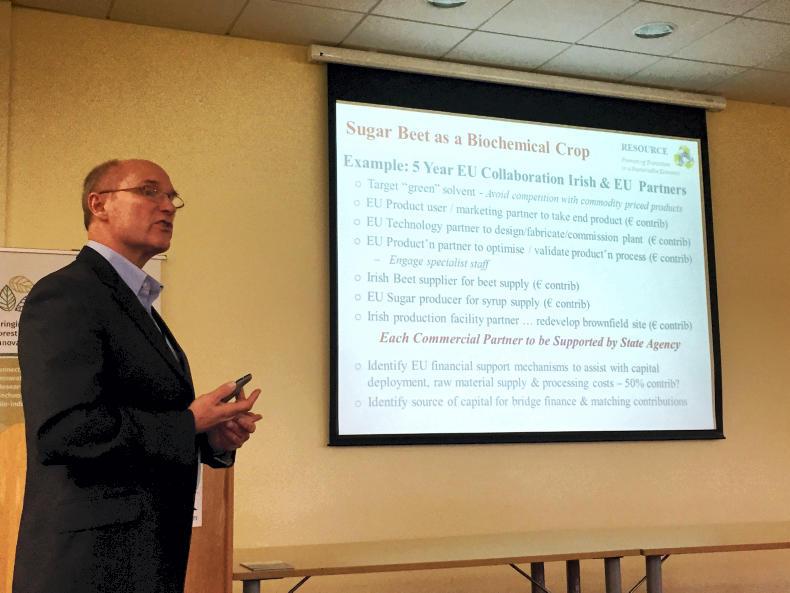Producing industrial chemicals from beet could be a more sustainable way of reviving the industry than sugar production, according to Bart Bonsall, technology leader at the State-funded Technology Centre for Biorefining and Bioenergy, which brings together Irish industry and universities.
“The value of the chemical output is significantly higher than the value of the food output,” Randall told a meeting of the AgriForValor bioeconomy project at Teagasc Grange last Friday. He presented calculations based on the price of lactic acid, a chemical widely used in the pharmaceutical and food industries and trading at €1,000/t.
Based on a conversion rate of 80% from raw sugar and Teagasc’s estimated recovery cost of Irish sugar at €308/t, this would leave a gross margin of more than 60%, or nearly €500/t of sugar produced.
While the cost of converting sugar to lactic acid through well-established fermentation technology would have to be taken out of this margin, Bonsall argued that this would still compare favourably to selling sugar. The average EU price for white sugar has been in the low €400s for the past two years, but this could fall with the end of EU sugar quotas this year.
Refinery
To insulate against this volatility, he advocated developing a pilot biorefinery in Ireland to produce 2,000t of lactic acid annually. This would require farmers to grow 180ha of beet and a refinery with eight staff to process it.
Bonsall estimated that the project would cost €12.6m, which could be partly funded through grants – especially those currently available from the EU to develop alternatives to oil-based chemicals.
Michael Hoey of Beet Ireland, which is promoting the revival of the industry, said biochemicals should be part
of it but cautioned against “dismissing the sugar part of it”.
Read more
Watch: Teagasc unveils new digester at biogas workshop
Producing industrial chemicals from beet could be a more sustainable way of reviving the industry than sugar production, according to Bart Bonsall, technology leader at the State-funded Technology Centre for Biorefining and Bioenergy, which brings together Irish industry and universities.
“The value of the chemical output is significantly higher than the value of the food output,” Randall told a meeting of the AgriForValor bioeconomy project at Teagasc Grange last Friday. He presented calculations based on the price of lactic acid, a chemical widely used in the pharmaceutical and food industries and trading at €1,000/t.
Based on a conversion rate of 80% from raw sugar and Teagasc’s estimated recovery cost of Irish sugar at €308/t, this would leave a gross margin of more than 60%, or nearly €500/t of sugar produced.
While the cost of converting sugar to lactic acid through well-established fermentation technology would have to be taken out of this margin, Bonsall argued that this would still compare favourably to selling sugar. The average EU price for white sugar has been in the low €400s for the past two years, but this could fall with the end of EU sugar quotas this year.
Refinery
To insulate against this volatility, he advocated developing a pilot biorefinery in Ireland to produce 2,000t of lactic acid annually. This would require farmers to grow 180ha of beet and a refinery with eight staff to process it.
Bonsall estimated that the project would cost €12.6m, which could be partly funded through grants – especially those currently available from the EU to develop alternatives to oil-based chemicals.
Michael Hoey of Beet Ireland, which is promoting the revival of the industry, said biochemicals should be part
of it but cautioned against “dismissing the sugar part of it”.
Read more
Watch: Teagasc unveils new digester at biogas workshop





SHARING OPTIONS